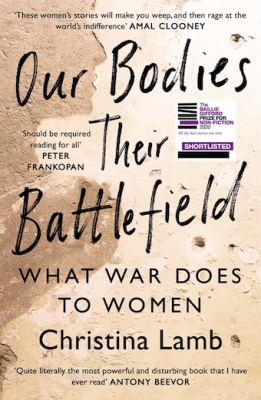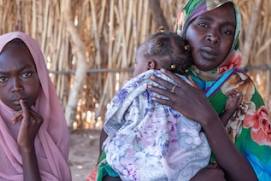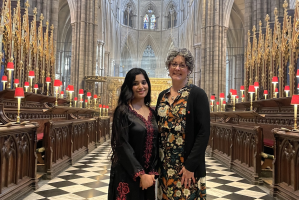Book: Our Bodies, Their Battlefields by Christina Lamb

Our Bodies, Their Battlefields by Christina Lamb, published by William Collins Books, £10.99
While many war correspondents report on battles or military equipment, Christina Lamb's articles in the Sunday Times often focus on civilians in conflict zones.
In her most recent book, she examines how rape is a weapon of war and its devastating consequences in traditional conservative societies.
She interviews survivors in Bangladesh, Bosnia, Rwanda, the DRC, and Argentina, as wells as women from persecuted minorities such as the Yazidi (Iraq) and the Rohingya (Myanmar).
Two themes emerge: the first is that victims find no sympathy from their families. They bring shame on their community because they did not resist their rapists to the point of death. A girl is only worthwhile in many parts of the world if she has an intact hymen, and a wife is merely property. Once defiled, these survivors are despised because they are thought to bring shame on their families and communities. No one has the empathy to imagine enduring a gang rape, and the natural instinct to survive.
The other theme is the reluctance of judicial systems to recognise rape as a weapon of war. Thousands of Yazidi women and girls were captured by ISIS, sold many times on Arab and Turkish WhatsApp groups or in Syrian or Iraqi markets, and gang raped continually. Yet Iraqi courts refuse to prosecute ISIS members for rape, saying the victims should be satisfied that jihadists are convicted of terrorism. This denies the victims the recognition that a crime was committed against them, or the possibility of justice. More than 2000 Yazidi women remain in slavery in Turkey, Syria and Iraq, but nothing is done to free them, although their whereabouts are known by the authorities.
Judges often reverse a rape conviction on appeal for technical reasons, not caring about the devastating impact on the brave witnesses who defied cultural norms to testify. Judges in Rwanda openly laughed at victims' stories, and even ICC staff shrugged off the idea of prosecuting because "there was no crime against humanity."
The hardest chapter to read deals with the continuing mass rape of babies, children and women in the Congo. Nobel laureate Dr Denis Mukwege heroically repairs broken bodies despite threats from the corrupt DRC regime, the militias and government soldiers responsible for the violence. War lords wishing to clear a village so they can mine coltan (for your mobile phone) rape their victims in public, instilling terror and causing hundreds of thousands to flee. But there is also a culture that perpetuates the belief that illness such as HIV can be cured by raping an infant.
A member of the provincial parliament in DRC raped 48 babies. His supporters collected the blood, believing it would protect them in battles. When parents complained to the police, the parents were arrested. The West has too much vested in sourcing of minerals to put any pressure on the DRC regime, accepting blatantly false election results in a recent presidential election.
In the UK, only 3.3% of rape reports result in conviction, so we have no grounds to feel smug. Besides the brave women prepared to talk to Lamb, and to make a fuss, knowing they will face appalling treatment, a local hero emerges: William Hague. He was the first foreign minister to suggest that sexual violence deserved attention. He convened a four-day conference in London which raised the profile and fostered solidarity among participants from around the globe. His efforts ten years ago were allowed to wither.
Lamb continues her important work, recently investigating the systematic castration of Ukrainian soldiers by Russians who have been trained to brutalise them.


















